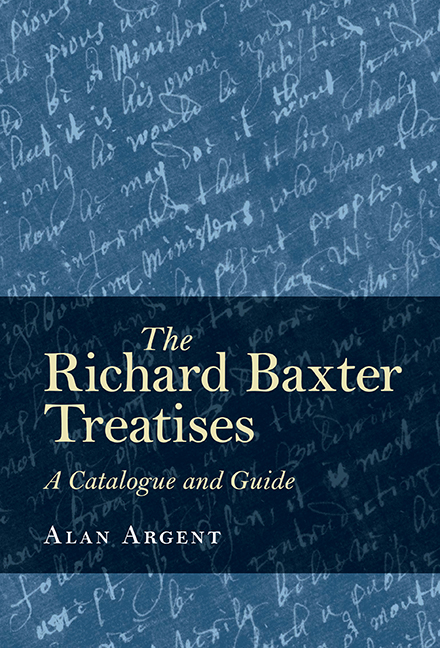Foreword
Published online by Cambridge University Press: 15 August 2018
Summary
The Baxter Treatises, held in Dr Williams's Library, London, are an unrivalled primary source for seventeenth-century history, chiefly, but not exclusively, religious and ecclesiastical history. They consist very largely of the papers of the Puritan divine Richard Baxter (1615–91), with other associated manuscripts. Baxter served as a chaplain in the Parliamentarian army during the Civil Wars, and during the Commonwealth and Protectorate he was a renowned pastor at Kidderminster in Worcestershire. At the Restoration, he was the dominant negotiator on the ‘Presbyterian’ side in the discussions to reach a church settlement, and thereafter the leading nonconformist, rivalled only by the Congregationalist John Owen. In these various roles, he was repeatedly consulted by political and religious leaders, dealing at first hand with Cromwell; Charles II; the Lord Chancellor Edward Hyde, 1st Earl of Clarendon; Gilbert Sheldon, Archbishop of Canterbury; and John Tillotson, future Archbishop of Canterbury, as he tried repeatedly to secure a more inclusive national church that could accommodate the majority of nonconformist opinion. He developed a distinctive mediating theological and ecclesiastical position that came to be known as ‘Baxterianism’, which had a lasting influence on dissent and, indeed, on latitudinarian or ‘low church’ Anglicanism.
Throughout this extraordinarily industrious career Baxter was also one of the most prolific and successful English writers of the early modern period – or, indeed, of any period. He was the author of some of the seventeenth century's bestsellers, such as the repeatedly reprinted The Saints Everlasting Rest (1650), The Reformed Pastor (1656) and the Call to the Unconverted (1658), but in addition, in the course of his fifty-year literary career, he published also four massive folios each of 1,000,000 or so words, many quartos of 500 or more pages, and countless smaller tracts and treatises. In all, somewhere in the region of 140 distinct titles appeared over his name. This was productivity enough for any man, but for Baxter it was only part of his output. He was besides an indefatigable correspondent (some 1,200 letters are extant) and generator of unpublished papers – controversial pieces, ecclesiastical proposals and ecumenical platforms, proposals and models for reform and reconciliation, and tracts responding to particular published works by others and commenting on current affairs.
- Type
- Chapter
- Information
- The Richard Baxter TreatisesA Catalogue and Guide, pp. vi - viiiPublisher: Boydell & BrewerPrint publication year: 2018



